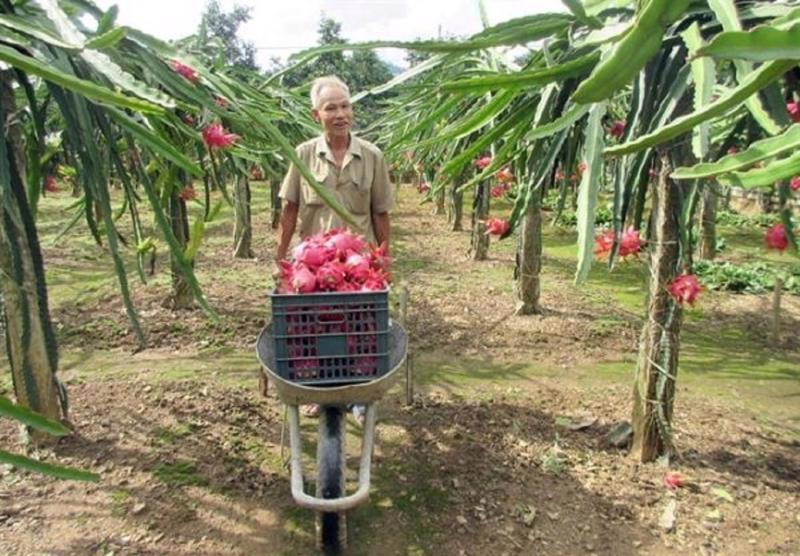The Ministry of Agriculture and Rural Development (MARD) and the United Nations Development Program (UNDP) on August 17 introduced for the first time an innovative e-traceability system to track the origin and carbon footprint of dragon fruit produced in south-central Binh Thuan province.
Local and international consumers buying or importing dragon fruit from the key production region of Binh Thuan can now scan a QR code to trace origin and the level of “green” or environmentally-friendly practices applied to grow the fruit.
In the context of a green transition taking place in agriculture, this is an important tool for local producers and businesses in Vietnam to track and manage emission levels in the supply chain and avoid unnecessary restrictions on exporting to high-end markets, where use of the carbon border adjustment mechanism is on the rise.
The system was introduced at a conference co-hosted by MARD and UNDP on Digital Transformation towards Green Agriculture and Sustainable Development.
Key topics at the conference included the strategic roadmap for digital transformation in agriculture and rural development, harnessing digital platforms to monitor and trace carbon footprints within crucial export sectors, fostering eco-conscious, low-carbon emissions supply chains for produce such as dragon fruit and shrimp, implementing digital systems to enhance rice production management, establishing robust data architecture for the agricultural and rural landscape, and forging synergies between local and central entities in the digital revolution to champion green and sustainable agricultural practices. Several smart agricultural models embracing digital transformation aligned with sustainable agriculture and rural development strategies were spotlighted.
Participants engaged in fruitful discussions regarding the cooperation between government and international organizations to develop data for green and sustainable development in Vietnam agriculture, the need to create digital solutions following standards to serve production, processing, and consumption along the chain, and to promote sustainable production areas toward strategic export markets, as well as the formation of a working group in digital transformation for agriculture.
In Vietnam, digital infrastructure in rural areas still needs to be improved. The scale of digital conversion applications must be expanded and synchronized between regions and localities. Farmers’ awareness and skills in using smart devices remain limited, cultivation areas are small, and agricultural enterprises are yet to invest significantly in digital transformation. Implementing the process in agriculture and rural development therefore necessitates the participation of State management agencies at the central and local levels as well as businesses.
Deputy Minister of Agriculture and Rural Development Hoang Trung emphasized that “digital transformation is an objective requirement, the responsibility, obligation, and interest of the entire system, industry, enterprises, technology, and farmers in particular. It is a crucial instrument for producing high-quality agricultural products at the lowest cost and most significant profit.”
He added that the ministry has established the Center for Digital Transformation and Agricultural Statistics, in charge of information technology, digital transformation, and information security within MARD’s function of advising and assisting the Minister in unifying the implementation of information technology application, digital transformation, and e-Government development within the sector.
“We are proud to cooperate with MARD in spearheading innovative solutions to support the green and sustainable transformation in agriculture,” said Mr. Patrick Haverman, UNDP Deputy Resident Representative in Vietnam. “We are happy that digitalized carbon traceability systems have been established for two major export commodities in Vietnam - dragon fruit and shrimp. The tool is essential for local government, businesses, producers, and consumers to operate in a green economy, where ‘green’ identities and ‘green’ standards are the new normal. By harnessing technology to drive climate-smart practices of businesses and enhance the resilient livelihoods of local farmers, we are collectively paving the way for a greener, more prosperous future for Vietnam’s agriculture sector.”
According to a press release from the UNDP, the “Accelerating private sector engagement in climate resilient and low emission investment opportunities in Vietnam’s NDC” project is being jointly implemented by MARD and UNDP in cooperation with Binh Thuan province and the Mekong Delta’s Bac Lieu province from 2019 to 2023.
With financial support from the Governments of Germany, Spain, and the European Union, the project aims to actively encourage private sector engagement to finance, support, and implement technically-sound, financially-viable, risk-informed mitigation and adaptation action to support Vietnam’s NDC targets in agriculture.









 Google translate
Google translate